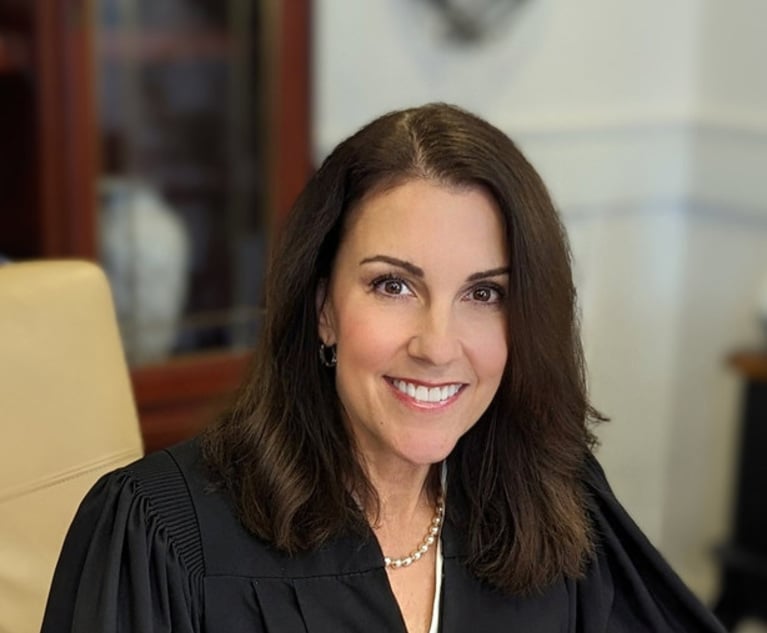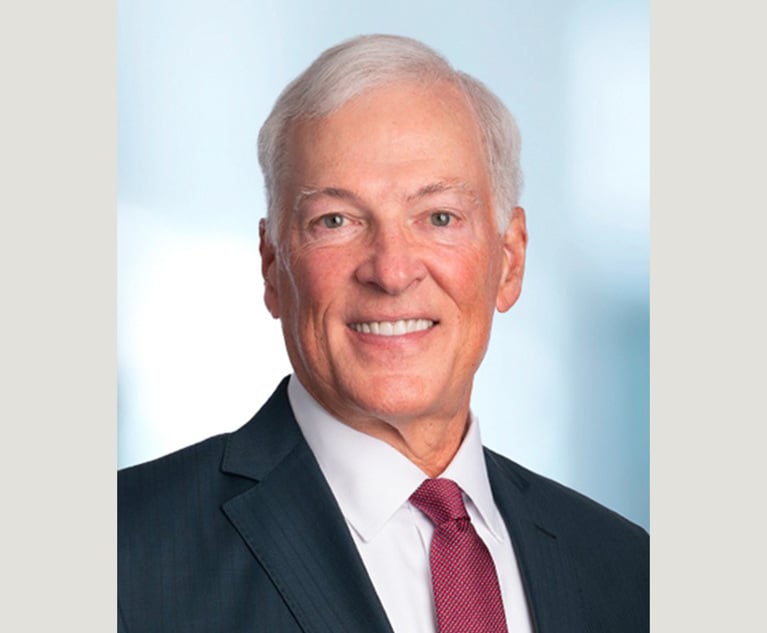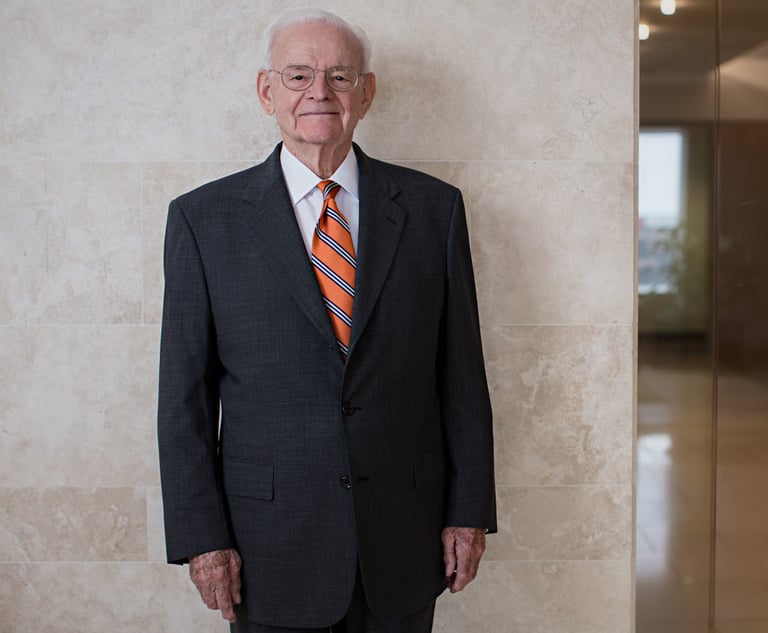 Carolyn Carluccio, a candidate for the state Supreme Court. (Courtesy photo)
Carolyn Carluccio, a candidate for the state Supreme Court. (Courtesy photo) Montco President Judge Carolyn Carluccio Seeks Seat on Pa. Supreme Court
The greatest threat to the practice of law is judicial activism, where judges overstep their authority, subverting the Constitution.
October 16, 2023 at 10:29 AM
6 minute read
Candidate: Carolyn Carluccio.
Court: Supreme Court.
Party: Republican.
Pennsylvania Bar Association Rating: Highly recommended.
The following has been edited lightly for style.
The Legal Intelligencer: How would you describe your judicial philosophy?
Carolyn Carluccio: My judicial philosophy is rooted in upholding, applying and defending the Constitution. I staunchly believe in the separation of powers and stand against legislating from the bench. I reject judicial activism, always striving to respect the judiciary's boundaries and ensure justice according to established legal principles.
The Legal: What makes you the best candidate for the role?
Carolyn Carluccio: I possess a unique blend of experience, from federal prosecutor to chief public defender and president judge. My commitment to upholding the law is unwavering. Notably, I am the only candidate for the Supreme Court who firmly rejects judicial activism, ensuring a judiciary that respects its boundaries and the Constitution.
The Legal: What is the greatest threat to the practice of law or problem the profession faces?
Carolyn Carluccio: The greatest threat to the practice of law is judicial activism, where judges overstep their authority, subverting the Constitution. Instead of interpreting the law, they impose personal beliefs, undermining the judiciary's integrity and eroding public trust. This activism disrupts the delicate balance of power in government, compromising the very foundation of our legal system.
The Legal: What does your party membership say about you and your legal outlook?
Carolyn Carluccio: The beliefs of my political party are diverse and, while I may not share the same perspective on every issue, they know that I will defend the Constitution and uphold the law above all else. When a judge's guiding principle is following the law, political beliefs become secondary, because we all love and believe in our Commonwealth and country and the system of government created to protect our individual freedoms.
The Legal: Do you think courts in Pennsylvania have a perception problem when it comes to appearing partisan or polarized? If so, what would you do to combat this?
Carolyn Carluccio: First and foremost, we need to keep partisan politics out of our courts. It's vital that we elect judges whose only priority to upholding the law and defending the Constitution. When we elect judges based on their personal beliefs on particular issues, we lose sight of the judiciary's role in government. Judges call balls and strikes. Judges are the firewall that protects individual freedoms and democracy.
The Legal: Several CLEs and bench-bar panels have recently addressed the growing phenomenon of distrust in the courts. In your view, how has distrust in the judiciary created challenges for the bench, and how should judges respond?
Carolyn Carluccio: Judges must hold themselves to the highest standard of personal ethics. Scandals in the judiciary, some of which have occurred in our own Pennsylvania Supreme Court, erode confidence in our judiciary. I would be remiss if I didn't note that one recent scandal involved my opponent and his brother, who had to step down as a Supreme Court justice as a result.
The Legal: What factors matter in deciding when recusal is necessary, and would you recuse yourself if a campaign contributor were involved in litigation as a party or attorney before you?
Carolyn Carluccio: Personal bias, prior involvement with a case as an attorney, financial interests, familial relationships with a party involved and prior public statements are all factors that must be weighed when determining recusal. Certainly, a major campaign supporter, whether direct or indirect, could raise a claim of bias. When it comes down to it, we want the public to trust each matter that comes before us is determined fairly and based on the law. Each situation must be weighed individually but, yes, it wouldn't be unreasonable to say that recusal may be warranted.
The Legal: What two decisions or cases are you most proud of, and why? Conversely, what two opinions or cases would you like to take back or revise if you could and why?
Carolyn Carluccio: I've handled significant malpractice and criminal cases, but I'm proudest of my work in the Family Court Division. This area is emotionally charged, with every judicial decision having profound effects. In one case, two girls were estranged from their father due to their mother's long-standing emotional abuse. Over two years, I facilitated their reunion, helping them rebuild trust. Five years later, the father sent a heartfelt letter, crediting me for reestablishing their bond.
Regarding regrets, there are instances where the law dictated outcomes I didn't personally agree with. In one case, a woman lost her hand at her workplace. Although her situation was tragic, having already received workman's compensation, the law prevented her from further claims against her employer. I sympathized with her but had to uphold the law.
The Legal: The relationship between the General Assembly and the Supreme Court appears to have become strained in recent years. Is that a concern, and, if elected to the high court, what would you do about that?
Carolyn Carluccio: I feel like a broken record. The Legislature is elected to make law. The judiciary serves to uphold the law and protect the Constitution. I would reject judicial activism.
The Legal: How important is stare decisis, and when should a court depart from it?
Carolyn Carluccio: Judicial precedent is important as it brings consistency and predictability to our legal system. It also increases efficiency in our courts and can even limit judicial power. However, if a past decision is clearly erroneous, it's entirely in the power of the Judiciary to overrule it. This power must be exercised judiciously as it has broader implications for our legal system.
The Legal: How important is consensus—particularly unanimous consensus—in appellate court opinions? Are there limits when a judge should only concur?
Carolyn Carluccio: While a unified stance in appellate court decisions reinforces the judiciary's authority, public confidence and offers unambiguous direction, concurring opinions are vital for underscoring subtle distinctions and presenting varied viewpoints. Nonetheless, they should be employed with discretion to preserve the court's decisiveness and credibility.
The Legal: Who are your role models and mentors?
Carolyn Carluccio: My family's influence has been paramount in my life and career. My father, a first-generation Italian American, imparted strong ethics. My Irish Catholic mother emphasized confidence and discipline. Most notably, my uncle Joe, as Montgomery County's District Attorney, kindled my passion for law. Their combined guidance has shaped my values, character, and the judge I've become, driving me to serve with integrity and dedication.
NOT FOR REPRINT
© 2025 ALM Global, LLC, All Rights Reserved. Request academic re-use from www.copyright.com. All other uses, submit a request to [email protected]. For more information visit Asset & Logo Licensing.
You Might Like
View All
Superior Court Directs Western Pa. Judge to Recuse From Case Over Business Ties to Defendant
3 minute read
Saxton & Stump Lands Newly Retired Ex-Chief Judge From Middle District of Pa.
3 minute read
'Discordant Dots': Why Phila. Zantac Judge Rejected Bid for His Recusal
3 minute read
Judge Louis C. Bechtle: An American Jurist Who Relied on Common Sense, Sound Judgment and Fairness
5 minute readTrending Stories
- 1We the People?
- 2New York-Based Skadden Team Joins White & Case Group in Mexico City for Citigroup Demerger
- 3No Two Wildfires Alike: Lawyers Take Different Legal Strategies in California
- 4Poop-Themed Dog Toy OK as Parody, but Still Tarnished Jack Daniel’s Brand, Court Says
- 5Meet the New President of NY's Association of Trial Court Jurists
Who Got The Work
J. Brugh Lower of Gibbons has entered an appearance for industrial equipment supplier Devco Corporation in a pending trademark infringement lawsuit. The suit, accusing the defendant of selling knock-off Graco products, was filed Dec. 18 in New Jersey District Court by Rivkin Radler on behalf of Graco Inc. and Graco Minnesota. The case, assigned to U.S. District Judge Zahid N. Quraishi, is 3:24-cv-11294, Graco Inc. et al v. Devco Corporation.
Who Got The Work
Rebecca Maller-Stein and Kent A. Yalowitz of Arnold & Porter Kaye Scholer have entered their appearances for Hanaco Venture Capital and its executives, Lior Prosor and David Frankel, in a pending securities lawsuit. The action, filed on Dec. 24 in New York Southern District Court by Zell, Aron & Co. on behalf of Goldeneye Advisors, accuses the defendants of negligently and fraudulently managing the plaintiff's $1 million investment. The case, assigned to U.S. District Judge Vernon S. Broderick, is 1:24-cv-09918, Goldeneye Advisors, LLC v. Hanaco Venture Capital, Ltd. et al.
Who Got The Work
Attorneys from A&O Shearman has stepped in as defense counsel for Toronto-Dominion Bank and other defendants in a pending securities class action. The suit, filed Dec. 11 in New York Southern District Court by Bleichmar Fonti & Auld, accuses the defendants of concealing the bank's 'pervasive' deficiencies in regards to its compliance with the Bank Secrecy Act and the quality of its anti-money laundering controls. The case, assigned to U.S. District Judge Arun Subramanian, is 1:24-cv-09445, Gonzalez v. The Toronto-Dominion Bank et al.
Who Got The Work
Crown Castle International, a Pennsylvania company providing shared communications infrastructure, has turned to Luke D. Wolf of Gordon Rees Scully Mansukhani to fend off a pending breach-of-contract lawsuit. The court action, filed Nov. 25 in Michigan Eastern District Court by Hooper Hathaway PC on behalf of The Town Residences LLC, accuses Crown Castle of failing to transfer approximately $30,000 in utility payments from T-Mobile in breach of a roof-top lease and assignment agreement. The case, assigned to U.S. District Judge Susan K. Declercq, is 2:24-cv-13131, The Town Residences LLC v. T-Mobile US, Inc. et al.
Who Got The Work
Wilfred P. Coronato and Daniel M. Schwartz of McCarter & English have stepped in as defense counsel to Electrolux Home Products Inc. in a pending product liability lawsuit. The court action, filed Nov. 26 in New York Eastern District Court by Poulos Lopiccolo PC and Nagel Rice LLP on behalf of David Stern, alleges that the defendant's refrigerators’ drawers and shelving repeatedly break and fall apart within months after purchase. The case, assigned to U.S. District Judge Joan M. Azrack, is 2:24-cv-08204, Stern v. Electrolux Home Products, Inc.
Featured Firms
Law Offices of Gary Martin Hays & Associates, P.C.
(470) 294-1674
Law Offices of Mark E. Salomone
(857) 444-6468
Smith & Hassler
(713) 739-1250





